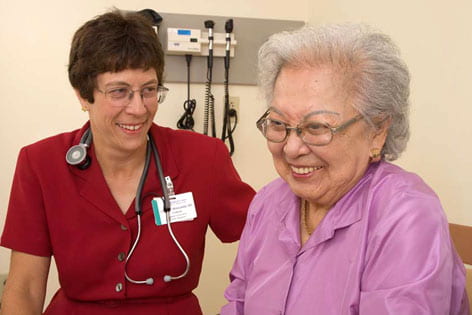Improving care for older adults
Dr. Laura Mosqueda takes her geriatric expertise on the road with the help of a $2 million grant. The goal: to help other medical specialists relate better to older patients.

Not long ago, Dr. Laura Mosqueda was presenting a talk to older adults and heard audience members describe experiences with doctors that made her blood boil.
“These patients felt dismissed, interrupted and belittled by their doctor when they sought clarification about their conditions,” says Mosqueda, head of UC Irvine’s renowned geriatrics program and the Center of Excellence on Elder Abuse & Neglect. “One patient said a doctor simply told her, ‘Well, you’re not a teenager anymore,’ as if that answered the question.”
Mosqueda believes there is a communication gap between many physicians and older adult patients that will only worsen as the U.S. population ages and demand for geriatric care increases.
“We need to restore a human touch to the doctor-patient relationship,” she says.
To that end, UCI’s geriatrics program will use a $2 million, four-year grant from the Donald W. Reynolds Foundation to enhance medical education in the care of older adults and develop strategies to help doctors nationwide better communicate with such patients.
Led by Mosqueda, Dr. Lisa Gibbs and project director Ann Abrams, a licensed clinical social worker, the university will seek ways to integrate geriatric principles throughout the School of Medicine’s curricula, including medical students and postgraduate study. UCI’s departments of anesthesiology & perioperative care, emergency medicine, psychiatry, family medicine, internal medicine and oncology have agreed to incorporate geriatrics education into their training to improve the doctor-patient relationship.
“Virtually every medical specialty treats older adults, yet not every physician is equipped to meet the particular needs of those patients, many of whom may have complicated medical conditions,” Mosqueda says. “Our goal is to develop the tools to help doctors meet those needs.”
Improving communication between physicians and patients is at the heart of the effort. Too often, she says, physicians don’t know how to speak properly to patients about their conditions and prognoses. “But more importantly, we don’t know how to listen properly,” Mosqueda says.
“Healthcare is not simply making a diagnosis or bringing the most current technology to bear on a medical problem,” Mosqueda says. “Doctors are obligated to communicate clearly with their patients, and we want to remedy the disconnect that often occurs, especially with seniors.”
The grant will fund the development of a protocol emphasizing clear communication in the doctor-patient relationship. Mosqueda’s team will work with medical faculty to identify issues or needs specific to their specialties and then develop solutions. UCI will collaborate with the University of Arizona to improve health literacy and with Vanderbilt University to create a database that tracks the new curriculum’s effectiveness.
Another important part of the effort is developing a module for UC Irvine Medical Center’s electronic patient record system that reminds physicians of older adults’ particular needs. It would identify potential conflicts in diagnoses and medications when doctors update patient records.
The lessons learned at UCI will be shared in a national database so that physicians, hospitals and medical schools across the country can benefit from the grant work done here.
The Donald W. Reynolds Foundation is a national philanthropic organization founded in 1954 by the late media entrepreneur for which it is named. Headquartered in Las Vegas, it is one of the largest private foundations in the United States.